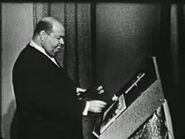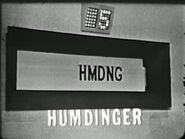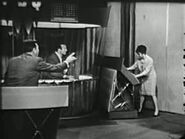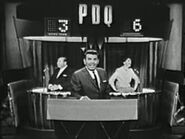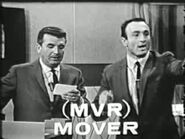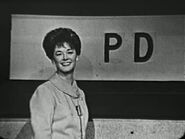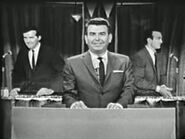| Hosts | |
| Dennis James Monty Hall (sub) | |
| Announcer | |
| Kenny Williams | |
| Broadcast | |
| Unsold Pilot for ABC Primetime: 1964Syndication (Daily): 9/6/1965 – 9/26/1969 | |
| Packager | |
| Merrill Heatter-Bob Quigley Productions | |
| Distributor | |
| Four Star Television | |
PDQ was the classic Heatter-Quigley game show where two celebrities go up against one celebrity and one civilian.
Gameplay[]
Main Game[]
Two teams of two competed in a game of deciphering words & phrases. One team was dubbed "The Home Team" (consisting of two celebrities), and the other was dubbed "The Challengers" (consisting of one celebrity & one contestant).
One player from each team was locked in a soundproof booth, while the outside team members were each shown the same answer. James would tell the player in the booth how many words were in the answer, following which he would give his "go" signal. The player in control then placed three letters on his/her respective board (the first of which always had to be the first), then the isolated partner took as many guesses as he/she wished as to what the answer was. Each time a musical tone was heard, an additional letter had to be added. As soon as the isolated partner guessed the correct answer, play went to the opposing team. The object of the game was to guess the word in as few letters as possible (if the guessing player gave the answer immediately after the time signal sounded, the team was still charged for the letter that should have been used). The team that used the fewest letters won the round.
There were two formats to the show:
Pilot[]
In the pilot, the teams played for points. The team with the fewest letters showing earned points based on the difference between how many letters were used between the teams. If both teams used the same number of letters, it was a draw and neither one scored. Both teams took an equal number of turns, and when a team reached five points or more, they switched jobs; they switched back, however, when the other team reached five points. The first team to reach 10 points won the game, and if The Challengers won, the contestant won $100 multiplied by the margin of victory, for a maximum of $1,000.
Series[]
In the series, the team that got the answer with the fewest letters won the game right away; in case of a tie, The Challengers won. Also, while a player had to begin their team's turn using the first letter, he/she could not begin with the first three letters (i.e. if the answer was “Mississippi”, “MIS” and “MSI” would be considered illegal); if he/she did, his/her team was given a penalty of two letters. Each show featured a maximum of five games: the first two games were regular games, while the rest were a best-of-three match called the "PDQ Special", in which the first team to win two games were the winners. Contestants in the series played for prizes. A small prize was awarded to him/her just for participating, win or lose. Each time The Challengers won either of the first two games, the contestant won a medium prize; in the case of the "PDQ Special", however, if The Challengers won the match, the contestant won a bigger prize.
Bonus Game[]
Regardless of how The Challengers did, the contestant played a bonus game at the end of the show. He/She had to guess ten short and simple words after being shown three letters from each one (Ex: FRC - "FORCE"). Unlike most bonus rounds, instead of being given a time limit for the entire round, the contestant was given five seconds for each individual word. Each correct answer he/she gave was worth a $25 Spiegel gift certificate (doubled to $50 if The Challengers used as many or fewer letters than The Home Team during the show), and solving all ten words also won a car; this goal, however, made it a high level of difficulty to achieve, and as a result, very few cars were won.
In the pilot, the rules were the same, except there was no car involved, while the value for each correct answer was determined based on whether or not The Challengers won the game, and awarded in cash.
Merchandise[]
A Board Game was released by Milton Bradley in 1965.
Pictures[]
Pilot Screenshots[]
Rating[]
Studio[]
NBC Studio 1, Burbank, CA
Trivia[]
The show was revived in 1973 as Baffle.
Links[]
Information on the PDQ home game


